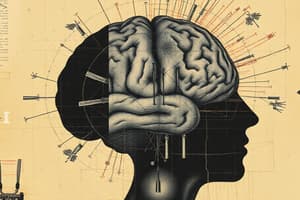Podcast
Questions and Answers
What is the primary distinction between disordered states of consciousness and altered states of consciousness?
What is the primary distinction between disordered states of consciousness and altered states of consciousness?
- There is no distinction between the two.
- Disordered states are temporary, while altered states are permanent.
- Disordered states involve drug use, while altered states do not.
- Disordered states involve lack of responsiveness, while altered states change mental activity. (correct)
What does consciousness consist of?
What does consciousness consist of?
Awareness of external events and mental processes.
Hypnosis is one way to achieve altered states of consciousness.
Hypnosis is one way to achieve altered states of consciousness.
True (A)
Which of the following can result in altered states of consciousness?
Which of the following can result in altered states of consciousness?
What is a common experience of altered state of consciousness?
What is a common experience of altered state of consciousness?
What is ayahuasca considered by the members of Uniao do Vegetal?
What is ayahuasca considered by the members of Uniao do Vegetal?
People can report their experiences during all forms of altered states of consciousness.
People can report their experiences during all forms of altered states of consciousness.
Flashcards are hidden until you start studying
Study Notes
Consciousness
- Consciousness is awareness of both external events and internal mental processes.
- Consciousness is subjective and unique to each person.
- Changes in consciousness include shifts in perceptions, emotions, memories, time sense, thoughts, feelings of self-control, and suggestibility.
- Altered states of consciousness (ASCs) are states that differ from normal awareness.
- ASCs are characterized by changes in the quality and pattern of mental activity.
- Many ASCs can be achieved through hypnosis, meditation, drug use, and sleep.
Disorders of Consciousness
- Disorders of consciousness are long-term lacks of consciousness and responsiveness.
- Examples of disorders of consciousness include:
- Coma
- Persistent Vegetative State
Altered State of Consciousness
- Altered states of consciousness often include heightened self-awareness.
- Examples of ASCs include:
- Sleep
- Dreaming
- Daydreaming
- Long-distance running
- Listening to music
- Making love
- Consuming psychedelic substances (e.g., ayahuasca)
- Engaging in meditation practices (e.g., Buddhist meditation)
- Participating in spiritual ceremonies (e.g., Turkish whirling dervishes)
Studying That Suits You
Use AI to generate personalized quizzes and flashcards to suit your learning preferences.



